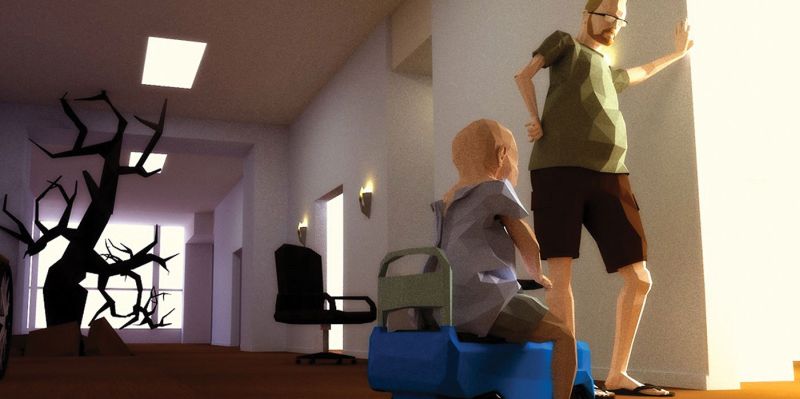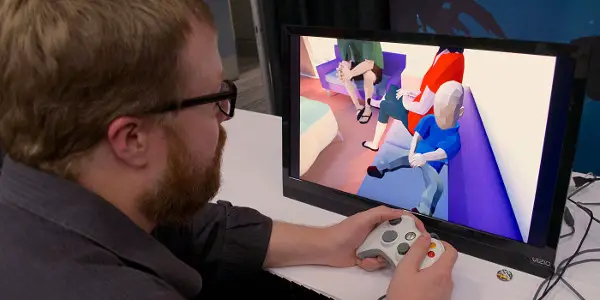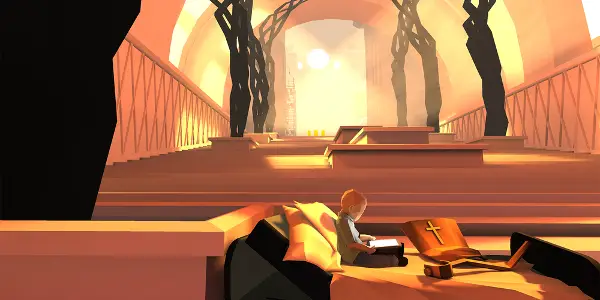THANK YOU FOR PLAYING: Love And Loss In Interactive Art

Rachel is an MA Film and Screen graduate from Goldsmiths,…
Ryan and Amy are sitting nervously on a sofa in a nondescript room. A doctor addresses them, “Mr and Mrs Green, I’m sorry, it’s not good news”. The doctor continues to tell them that their one year old son’s chemotherapy has not worked. The second doctor adds, “We’re very good at end of life care”.
This opening to the documentary Thank You for Playing is taken from the video game “That Dragon, Cancer“. The documentary is about the video game’s developer, Ryan Green, and his wife, Amy, as they develop a video game based on their experiences with their terminally ill son.
The Virtual and the Real
Thank You for Playing is directed and produced by David Osit & Malika Zouhali-Worrall who spent two years with the Green family filming their daily lives, their trips to the hospital and their time spent with Joel. There are interviews with Ryan and Amy, cinematic sequences from the game and home footage that the family filmed. Osit and Zouhali-Worrall present an equal balance between a family’s experiences caring for their ill child and the development of “That Dragon, Cancer”.

The interviews with Ryan and Amy shed light on some of the decisions and ideas behind certain sequences in the game. Due to the nature of the game being abstract and poetic, it’s interesting to hear an insight into their creative decisions. As well as discussing the game they also talk openly about their experiences with Joel, his cancer and, as upsetting situation as they are in, both parents don’t hold back from sharing their strengths and weaknesses about raising a dying child. Creating the game allows Ryan to partially escape reality and the development of the game becomes a cathartic process for him and for Amy.
Video Games and Empathy
When making any form of art it is inevitable that a piece of the artist will be represented in their work. Their life reflections, personal philosophies and emotional experiences can make for deeply engaging piece of art. Although the argument of video games as art still continues on, it’s still acknowledged that the medium is profound in its ability to tell stories.
In the case with “That Dragon, Cancer”, Ryan has put his whole life into the game and Osit and Zouhali-Worrall greatly capture this in the documentary. The film shows the process of programming Joel’s small avatar, Ryan’s other children recording dialogue and the crafting of a giant virtual cathedral created for a religious sequence in the game. One of the more intimate moments in the films conversation between Ryan and Amy deciding whether to use Joel’s real cry in the game. It’s an important decision because it’s laying the boundaries for just how personal the game will be.

Thank You of Playing also touches upon the place of emotional and spiritual storytelling in the massive world of video games. When Ryan takes “That Dragon, Cancer” to PAX (one of the most famous video game festivals in America) it is quite obviously different from other games. Among the big flashy screens and loud noises, Ryan sets up his booth with two computers in a smaller quieter area of the festival.
It perfectly represents the placement of a poetic video game about cancer in the gaming industry. An industry where the topic of cancer has yet to be explored and that the idea of a poetic video game is still an indie dream. It conjures up a fear that people just won’t get it, a common fear that game developer Jonathon Blow reveals in Indie Game: The Movie. But in one of the more touching scenes of the film, a variety of gamers play “That Dragon, Cancer” and are obviously affected and moved by Joel’s story. The documentary shows players crying and hugging Ryan illustrating that “That Dragon, Cancer”’s themes are universally shared and are collective experiences.
Conclusion
At the age of one, Joel was given four months to live but he lived on for three years and “That Dragon, Cancer” is a celebration of Joel’s life and the emotional power that video games are capable of and Thank You for Playing is an extension of that. The film’s successful Kickstarter of $40,000 has allowed the directors to show the film in theaters world wide, an overwhelming achievement.
Thank You for Playing presents the ability of video games to capture personal experiences in a way that no other medium could. With the creation of That Dragon, Cancer the boundaries of empathy within technology is being pushed little-by-little. Thank You for Playing is a deeply moving film about the coming together of human experience and its place within interactive art.
Are you planning to see Thank You For Playing? Have you played “That Dragon, Cancer”? Let us know in the comments.
Does content like this matter to you?
Become a Member and support film journalism. Unlock access to all of Film Inquiry`s great articles. Join a community of like-minded readers who are passionate about cinema - get access to our private members Network, give back to independent filmmakers, and more.
Rachel is an MA Film and Screen graduate from Goldsmiths, University of London. Her interests lie in cinematic landscapes, interactive media, documentary film and general screen stuffs.













